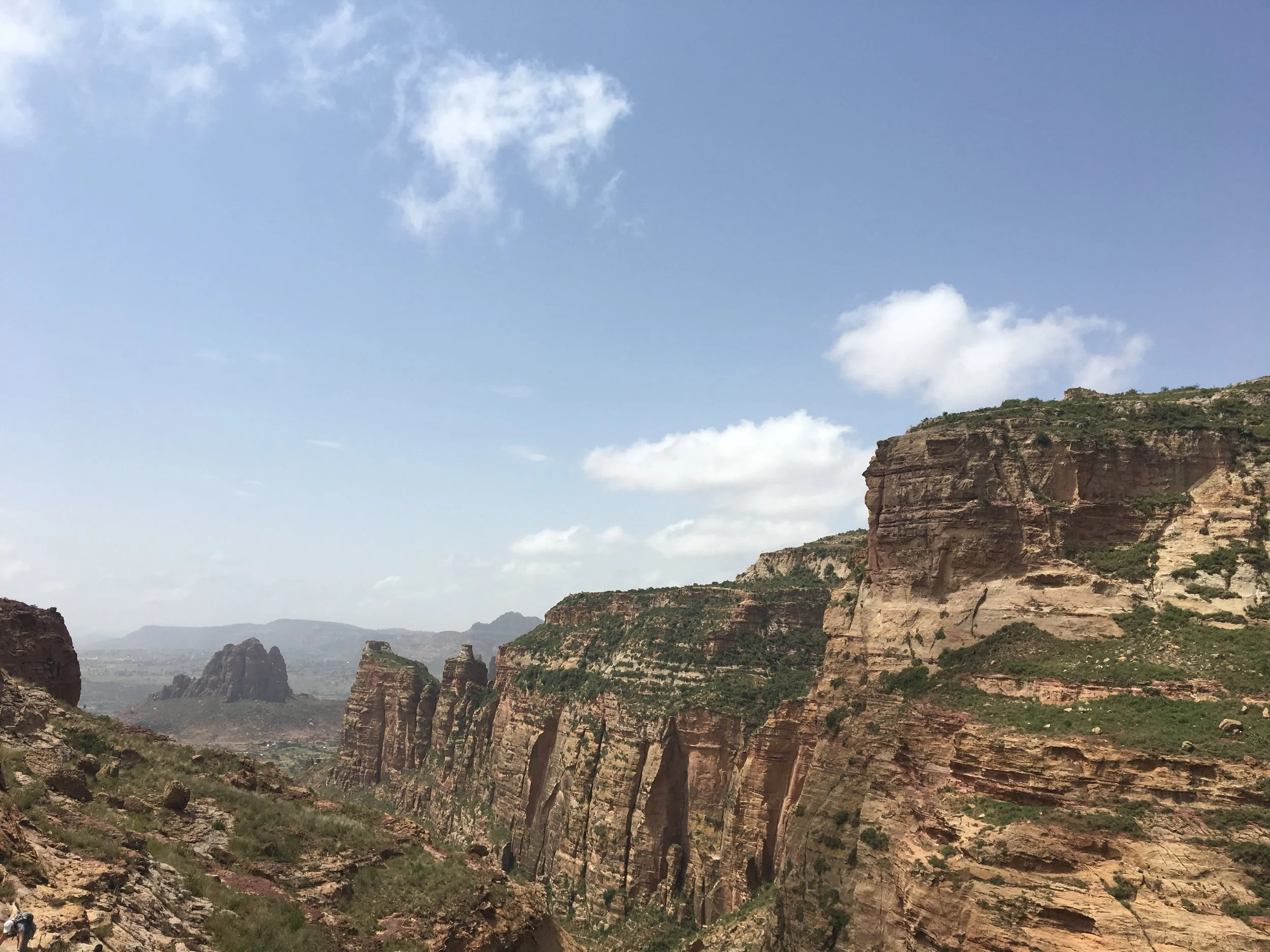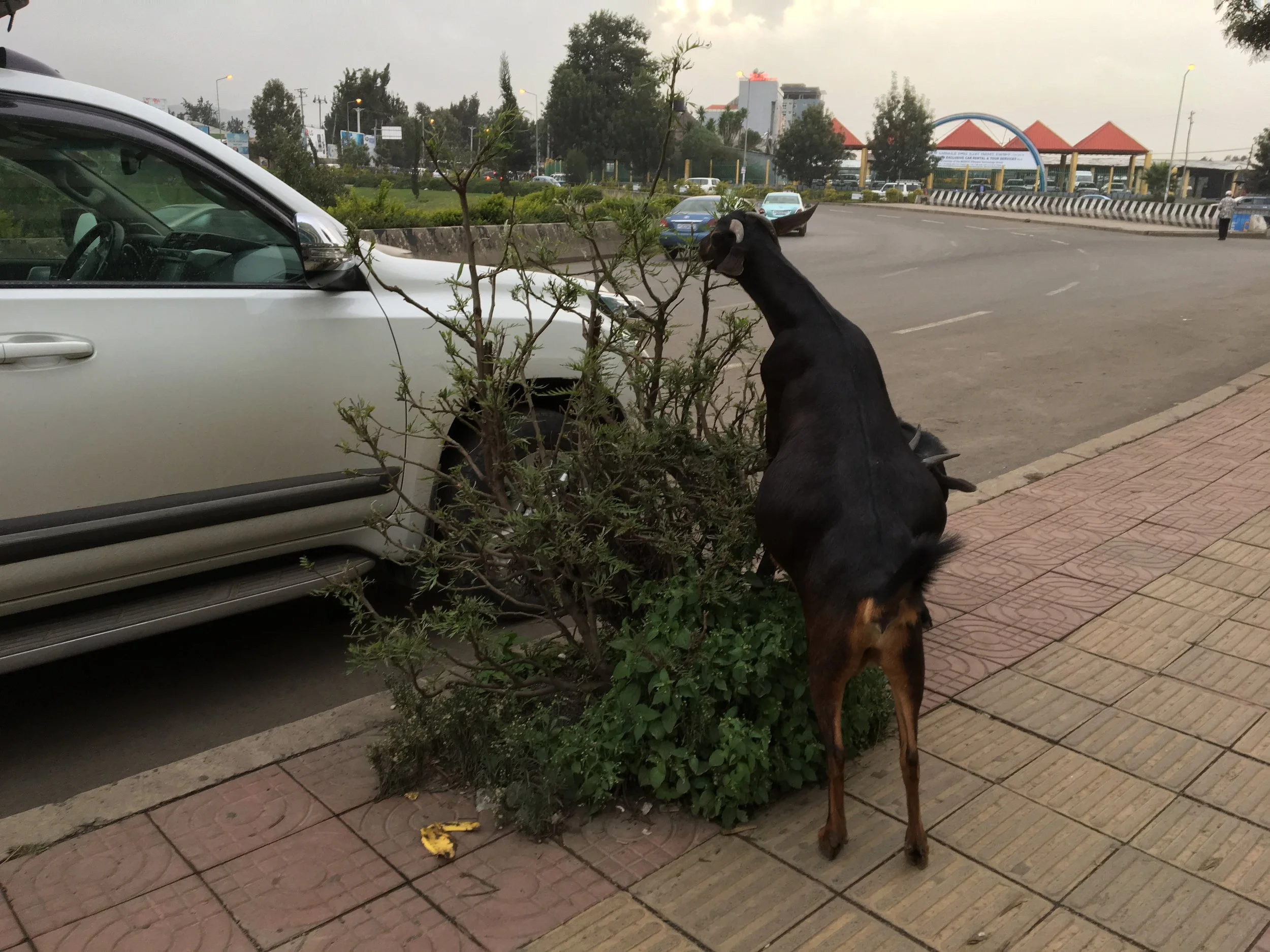The Fifth Month—Tirr/January
“Height of summer. Some sluggish rivers considered poisonous for cattle. Harvesting garden crops. Selling of produce to buy salt, chilies, coffee. Tax gatherers collect taxes for the government, for landlords, and for church tithes.”—The Wife’s Tale
A strange day—walked to school with my Bahrainian neighbor and realized she’s not a teacher but a student as she was wearing the pink primary school uniform. I can’t imagine being an adult and being in school amongst children. She’s already isolated being one of the few Muslim women here. I’ve no idea how old she is and realize I presumed a lot about her. As we walked together we passed a dead calf on the road (at first I thought it was a donkey). Some students said it was a jib (hyena) that killed it but later some boys told me it was, “gangsters—human hyenas” that did it. Life can be so brutal.
I have new neighbors, Mekdes, a traffic police officer, her husband, a construction worker, who is currently out of work recovering from falling off a building. They have three daughters.
Went to the gabeya (market) with my friend Kokeb who helped my buy a shiti (pajamas like a house dress) and oranges and rosemary. Following Kokeb through the packed market we ended up where the honey sellers had pots of honey swarmed by bees. I was so struck by the honey and bees, with piles of wood burning to try to keep the bees away.
Woke up one morning to a bright, almost full moon. It was 6.30 am. As I walked to school the moon was still out, my feet kicking up dry dust. The crescent moon here is in the shape of a cantaloupe slice, unlike the sickle shape we see in the west. It’s like being on another planet, a new alignment of constellations and solar system.
Samay insisted I put on her bright pink lipstick before we went to the market together. She had a leather mini-backpack “from Dubai” that said Luis Vuiton on the zipper—we took it to one of the market tailors to fix the broken zipper.
Walking through Butajira a man was selling cut-up pieces of fish in a plastic bag and asked if I wanted any. Where did he get the fish? I wonder.
Adjusting to being alone and isolated. Accepting that I constantly feel like I don’t know what I am doing or what’s going on. Accepting failure. Giving myself second chances to try again—to be better. Girma said that I was part of the family and that they loved me. He said to, “be frank and be happy.”
A boy asked me to make a kite for him on the walk to school. I’m now the kite maker.
A student produced a watering can full of water for me to wash the chalk dust off my hands after class.
My neighbor Mekdes had me over for buna and hambasha—I felt so warm and safe sitting in the dark with the light from the charcoal stove.
Gena
Gena is Ethiopian Christmas and was celebrated on January 7th. It marks the end of fasting which started in November where Ethiopians don’t eat meat or dairy products. I was so happy to have buna with milk again and eat aib.
I ate so much doro wot (three times in one day). Brike and Girma’s eldest son, who’s rather elusive, invited me to join he and his friend (a minibus driver) so I met another Ethiopian family, ate more doro wot, and drank tej.
Our Muslim neighbors were invited to join at Brike and Girma’s home—at first they weren’t served the meat because it wasn’t slaughtered Halal but then they said it was ok so they ate the meat. The lady who I always buy fruit from at the market lives on our road and she joined us as well. Girma got choked up and cried while we were praying. Two Muslims, one American, and a big, beautiful Ethiopian family = Christmas.
Timket
Timket is Ethiopian Epiphany, occurring on the 12th day of Christmas. Kella was decked out in yellow, green, and red banners.
The first day of Timket I had a humble meal of shiro and injera with my newest neighbor Meskerem and her daughters. I’m glad I got to experience sharing this holiday with a family not observing the traditional festivities.
Processions going to church—women shrouded in white, chanting, singing, ilililing, drumming, and blaring horns. The sound of the church goers reminds me of the Hari Krushnas at 14th street—frenetic, chaotic, energy.
Unintentionally, I was more of an observer than participant in Timket, as I didn’t realize I was to take myself to church so I missed the church activities. Later I was able to explain that I have never celebrated Timket as we don’t observe it in the US and my compound family understood and we all resolved I’d go with them to church next year.
The second day of Timket I played cards with Geta then Moma and I pretended to cook eggs and make buna, she dressed up in my clothes, and then we sifted teff.
Then I was fed doro wot, a mountain of aib, hambasha, and kinito and buna to drink. Two women argued and cried. The holidays seem to bring out emotions in everyone universally.
Everyday with Geta
I looked up to see Geta had been following me around the market. I let him know that I saw him but he continued to follow me around. My mischievous protecter.
I bought Geta a deck of cards and we played various versions of go fish, Ethiopian style while eating oranges.
Geta asked me to draw a picture of us together holding hands.
Geta has a cut on his arm which I patched up with Neosporin and a band aid.
Geta and I played football and burned chewing gum wrappers—the flames a blue green like the Northern lights.


